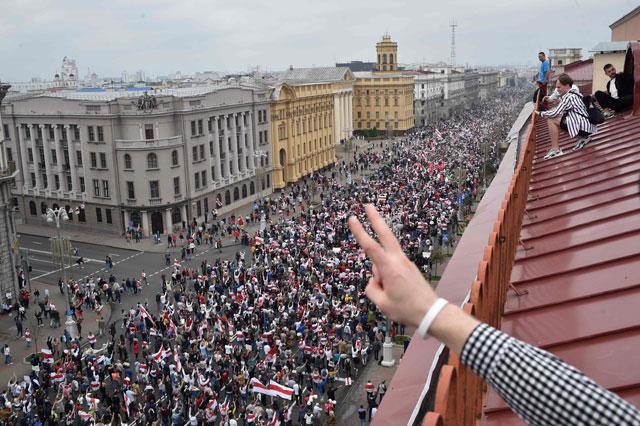- International News
- Mon-2020-08-24 | 05:14 pm

The authoritarian leader dispatched his notorious riot police to disperse spontaneous rallies that erupted after he claimed a sixth presidential term in an election two weeks ago that critics say was rigged.
Tens of thousands of demonstrators draped in the red-and-white flags of the opposition flooded Independence Square and marched through the capital chanting "freedom" and "we will not forget, we will not forgive" as passing cars honked in support.
"We have just two demands: Fair elections and stop the violence," 32-year-old Igor told AFP.
Officials issued a warning to Belarusians against participating in "illegal demonstrations" and local news outlets published videos on social media showing water cannon and riot police with shields moving towards Independence Square.
The defence ministry said it would intervene to protect "sacred” World War II memorials and several metro stations in Minsk were closed.
Opposition-leaning media and Telegram channels reported that more than 100,000 protesters had convened for the second Sunday in a row and an AFP journalist said smaller demonstrations erupted in provincial cities.
"Lukashenko wants everyone to leave and live like it was. But it won’t be like it used to be,” said Nikita, a 28-year-old protester.
Solidarity rallies were also due in neighbouring Lithuania, where demonstrators planned to form a human chain from Vilnius to the Belarus border, three decades after residents of the Baltic states joined hands and linked their capital cities in a mass protest against Soviet rule.
No ‘second Ukraine’
The EU has rejected the results of the election and has vowed to sanction Belarusians responsible for ballot fraud and a police crackdown that saw nearly 7,000 people arrested and sparked gruesome allegations of torture and abuse in police custody.
Top EU diplomat Josep Borell warned that Belarus should not be allowed to become a "second Ukraine” and said it was necessary to deal with the 65-year-old Lukashenko, Europe’s longest serving leader.
The man branded "Europe’s last dictator” has brushed aside the calls to go, dismissed the possibility of holding a new vote and instructed his security services to quell unrest and secure the borders.
His judiciary opened a criminal investigation into the opposition’s Coordination Council that is seeking new elections and the peaceful transition of power, after he said opponents wanted to "seize power”.
The former collective farm boss ordered the military into full combat readiness during an army inspection on Saturday near the border with the EU and warned about NATO troop "stirrings” in neighbouring countries.
"The fatherland is now in danger. We cannot joke,” Lukashenko said.
Lithuania’s President Gitanas Nauseda said Lukashenko was trying to "divert attention” from unrest at home, while NATO dismissed the claims as baseless.
‘Not afraid’
The unlikely leader of Belarus’s opposition, 37-year-old Svetlana Tikhanovskaya, fled to Vilnius fearing reprisals for mounting the greatest challenge to Lukashenko and claiming election victory.
In an interview with AFP ahead of the demonstrations, she urged protesters to continue to exert pressure on the authorities, saying it was "important to continue to be united in the struggle for the rights”.
The authorities have to understand "we are not a protest movement... we are a majority and we will not step away. We are not afraid of them any more.”
Lukashenko’s opponents have organised strikes and the largest protests in the ex-Soviet country’s recent history over his reelection, with more than 100,000 people turning out in Minsk alone last weekend.
Yet fewer workers at state-run factories — usually a bastion of support for Lukashenko — have continued to strike, with activists citing pressure from the authorities.
The president has threatened from Monday to shut down production lines where workers have put down their tools.
Staff at state-run media outlets have also staged walkouts and Lukashenko admitted this week that journalists from Russia had been flown in to replace them.
His powerful ally, Russia, has warned European leaders against interfering in Belarus and the Kremlin has said it would intervene in the post-election unrest if necessary.
US Deputy Secretary of State Stephen Biegun will visit Lithuania as part of a trip next week that will also include a stop in Russia for talks on the election fallout.
He is planning to meet with Tikhanovskaya, her representatives told AFP.
Lukashenko’s army inspection came ahead of large-scale military exercises planned on the border with the European Union between August 28 and 31.













